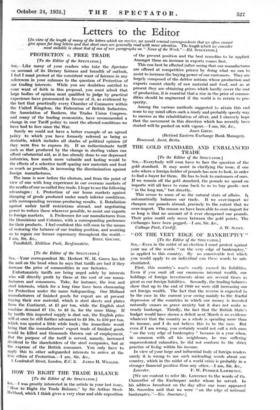Letters to the Editor
[I».-view of the lengthof many of the letters which we receive, we would reining correspondents that we often cannot give space for long letters and that short ones are generally read with more attention. The length. which we consider most suitable is about that of one of our paragraphs on " News-of the Week."—Ed. SrEcevrcia.]
PROTECTION v. FREE TRADE
[To the Editor of the SPECTATOR.] Sin,-Like many of your readers who take the Spectator on accmint of its literary fairness and breadth of outlook, I feel I must protest at the consistent want of fairness in any references in your columns to the question of Protection of our trading interests. While you are doubtless entitled to your want of faith in this proposal, you must admit that large bodies of opinion most ,qualified to judge by practical experience have pronounced in favour of it, as evidenced by the fact that practically every Chamber of Commerce within the United Kingdom, the Federation of British Industries, the Association of Bankers, the Trades Union Congress, and many of the leading economists, have recommended a change in our Tariff policy to meet the altered conditions we have had to face since the War.
Surely we could not have a better example of an agreed policy to which you have formerly referred as being so desirable, which includes all shades of political opinion (if they were free to express it). If an indiscriminate tariff such as that produced by the change in sterling values can afford substantial aid, as it has already done to our depressed industries, how much more valuable and lasting would be the effects of a selective tariff sparing raw materials and food as much as possible, in increasing the discrimination against foreign manufactures.
The issue is now before the electors, and from the point of view of one with long experience in our overseas markets of the results of our so-called free trade, I hope to see the following advantages : 1. Protection of our home markets against dumping of goods produced under much inferior conditions, with corresponding revenue-producing results. 2. Retaliation against unfair tariff restrictions abroad, and negotiating power to reduce these wherever possible, to assist our exports to foreign markets. 3. Preference for our manufactures from the Dominions and Colonies, with a corresponding preference for their products. I feel confident this will soon be the means of restoring the balance of our trading position, and assisting us to regain our former supremacy throughout the world.—














































 Previous page
Previous page